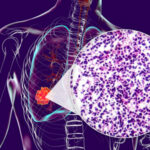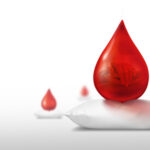-
Treatment Combination Improves Survival in EGFR-positive Lung Cancer
Adding chemotherapy to targeted therapy improves outcomes for people with advanced EGFR-positive non-small cell lung cancer.
by Sandra Gordon
-
Lessons From 20 Years Living With Cancer
Multiple myeloma survivor Jonathan Gluck reflects on uncertainty, and the scientific progress that has kept him living with cancer for more than two decades.
by Eric Fitzsimmons
-
From the Editor-in-Chief
Reducing Ovarian Cancer RiskResearchers examine whether removing the fallopian tubes could help prevent ovarian cancer.
by William G. Nelson, MD, PhD
-
Forward Look
A Combination Approach for EGFR-positive Lung CancerTwo targeted therapies used together extend survival for advanced non-small cell lung cancer but come with side effects.
by Darcy Lewis
-
Forward Look
Reducing Sexual Side Effects From Prostate Cancer SurgeryReal-time tumor analysis offers assurance to surgeons seeking to preserve nerves involved in erectile function.
by Carolyn Bernhardt
-
Forward Look
Improving Breast Cancer Outcomes After SurgeryAntibody-drug conjugate improves survival in people with early-stage HER2-positive breast cancer who have residual disease.
by Susan Kreimer
-
Forward Look
Cancer ‘Fingerprint’ Drives Vaccine DevelopmentA vaccine based on a tumor’s unique genetic mutations leads to lasting immune response in locally advanced kidney cancer.
by Christina Szalinski
-
The HER2 SHIFT
Antibody-drug conjugate provides an additional treatment option for people with HER2-low breast cancer.
by Kendall K. Morgan
-
Survivor Profile
Finding Her VoiceAurora Lucas uses social media to highlight the unique needs of young adult cancer survivors.
by Thomas Celona
-
Better Support for Blood Cancers
Despite receiving uniquely intensive therapies, people with blood cancers are less likely to receive palliative care than those with solid tumors.
by Cameron Walker
Cancer Talk
Connecting More Patients to Cancer Clinical Trials
AACR conference brings experts together to discuss strategies to reach people historically left out of cancer research.
by Eric Fitzsimmons
Treatment Combination Improves Survival in EGFR-positive Lung CancerAdding chemotherapy to targeted therapy improves outcomes for people with advanced EGFR-positive non-small cell lung cancer.
by Sandra Gordon
Lessons From 20 Years Living With CancerMultiple myeloma survivor Jonathan Gluck reflects on uncertainty, and the scientific progress that has kept him living with cancer for more than two decades.
by Eric Fitzsimmons
The Enduring Importance of Cancer Disparities ResearchOpening session from AACR conference highlights how perseverance and adversity have informed cancer disparities research over the years.
by Eric Fitzsimmons















